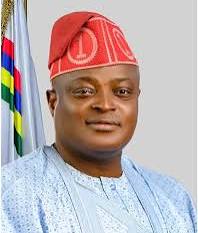The Nigerian Education Loan Fund, NELFUND, will, on the 22nd February, open its registration portal for Nigerian students waiting to apply for loan in the 2024/2025 session. Managing Director of the Fund, Mr. Akintunde Sawyyer disclosed at a press conference in Abuja, Monday, that the portal will close for the 2023/2024 session on the 21st February.
NELFUND was established in 2024 to provide interest free loans to Nigerian students with the aim of making higher education affordable and accessible for the all Nigerians. It offers interest free loans covering tuition and other fees charged by schools which are paid directly into the schools' account on behalf of the beneficies. It also offers student's upkeep loan of twenty thousand naira monthly paid into students' accounts. A student may choose either to take that or not.
Mr. Sawyyer advised intending beneficiaries to prepare against the date. He assured that all applications would be duly processed.
Here is how you can benefit from the loan.
First, you need to know that your data is secure with NELFUND and you can complete the application within 15-30 minutes. It's that fast and easy!
Eligibility
*You must be a Nigerian.
*You must be currently a student of a public higher institution of learning in Nigeria.
*You must not be a defaulter of loan from any registered finance institutions.
*Must not be a convict.
*Must not be a cultist
*You must not present fake documents and false information in the process of registration.
*There is no age limit.
Required Documents
According to the information on the Fund's website, you will need to upload a scanned copy of your admission letter and may upload a scanned copy your student identification in addition.
How to Apply for NELFUND Student Loan.
-Visit the official site of NELFUND: https://nelf.gov.ng
-Click on the "APPLY NOW" button to get started.
-Click "Get started" on the next window.
-Answer the questions on the next window.
-Click on the "Request for Student Loan" button and complete the loan application steps and submit.
-Your application will be reviewed. After successful verification, payments will be made to your institution for institutional charge, while the upkeep loan will be paid to the bank account you have provided in your profile.
According to information on the official site of the Fund, your application may be rejected:
If proven you have defaulted in any previous loan granted by any licensed financial institution. Submission of fake/fraudulent documents and being dismissed by any school authority for examination malpractices are further grounds for disqualification. In addition conviction for fraud and forgery, drug offences, cultism, felony, or any offences involving dishonesty also attract rejection of application.
Appeal
If your application is rejected you can appeal by sending a mail to the Fund.
Repayment
The loan is due for repayment at 10% of beneficiary's salary after two years of National Youth Service until the full loan amount is defrayed. Should a beneficiary still be unemployed at the time he/she should contact the Fund and swear to an avidavit to that effect.
.jpeg)

.jpeg)
.jpeg)
.jpeg)
.jpeg)



.webp)

.webp)






